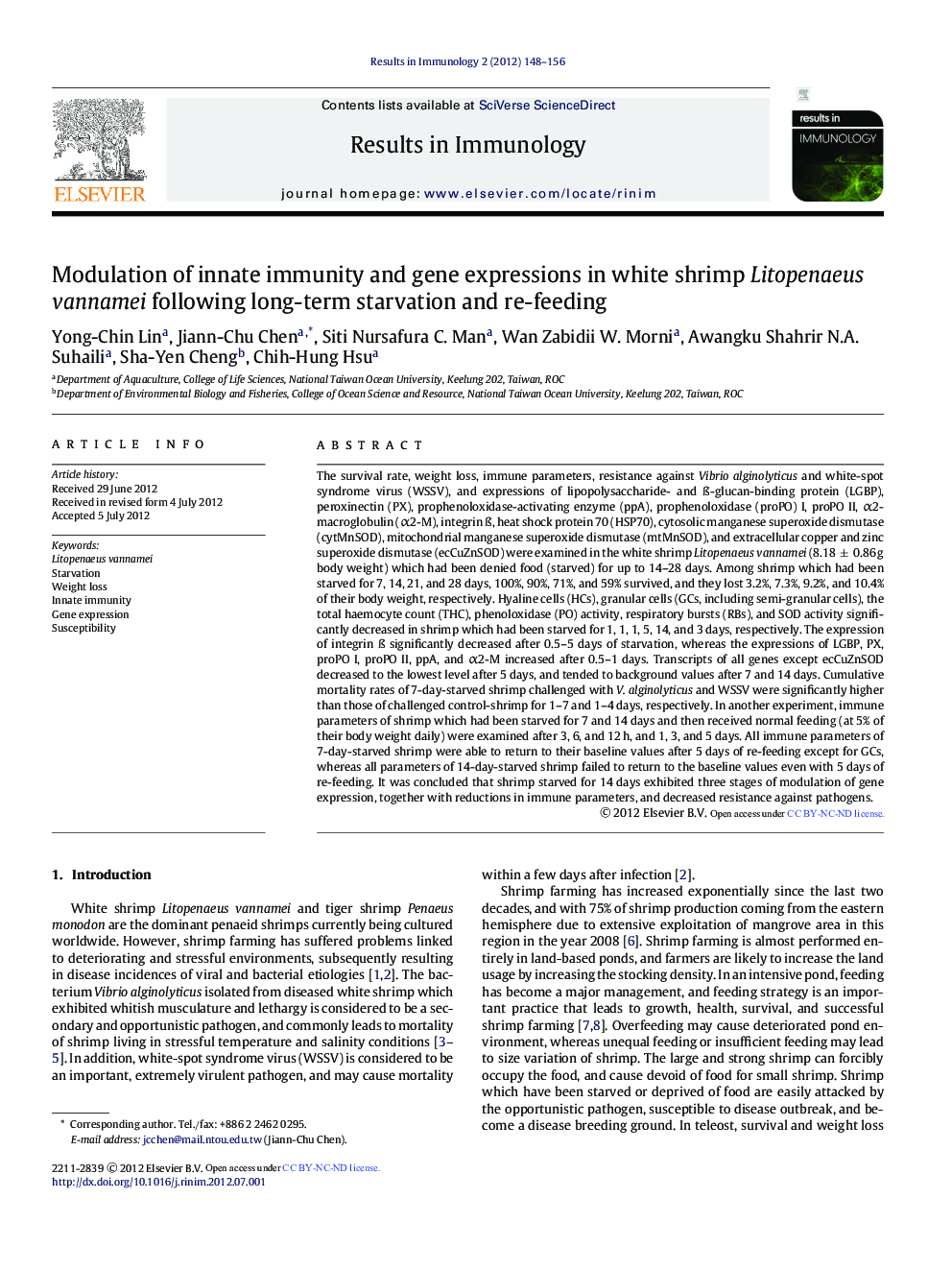| کد مقاله | کد نشریه | سال انتشار | مقاله انگلیسی | نسخه تمام متن |
|---|---|---|---|---|
| 2202437 | 1551337 | 2012 | 9 صفحه PDF | دانلود رایگان |

The survival rate, weight loss, immune parameters, resistance against Vibrio alginolyticus and white-spot syndrome virus (WSSV), and expressions of lipopolysaccharide- and ß-glucan-binding protein (LGBP), peroxinectin (PX), prophenoloxidase-activating enzyme (ppA), prophenoloxidase (proPO) I, proPO II, α2-macroglobulin (α2-M), integrin ß, heat shock protein 70 (HSP70), cytosolic manganese superoxide dismutase (cytMnSOD), mitochondrial manganese superoxide dismutase (mtMnSOD), and extracellular copper and zinc superoxide dismutase (ecCuZnSOD) were examined in the white shrimp Litopenaeus vannamei (8.18 ± 0.86 g body weight) which had been denied food (starved) for up to 14–28 days. Among shrimp which had been starved for 7, 14, 21, and 28 days, 100%, 90%, 71%, and 59% survived, and they lost 3.2%, 7.3%, 9.2%, and 10.4% of their body weight, respectively. Hyaline cells (HCs), granular cells (GCs, including semi-granular cells), the total haemocyte count (THC), phenoloxidase (PO) activity, respiratory bursts (RBs), and SOD activity significantly decreased in shrimp which had been starved for 1, 1, 1, 5, 14, and 3 days, respectively. The expression of integrin ß significantly decreased after 0.5–5 days of starvation, whereas the expressions of LGBP, PX, proPO I, proPO II, ppA, and α2-M increased after 0.5–1 days. Transcripts of all genes except ecCuZnSOD decreased to the lowest level after 5 days, and tended to background values after 7 and 14 days. Cumulative mortality rates of 7-day-starved shrimp challenged with V. alginolyticus and WSSV were significantly higher than those of challenged control-shrimp for 1–7 and 1–4 days, respectively. In another experiment, immune parameters of shrimp which had been starved for 7 and 14 days and then received normal feeding (at 5% of their body weight daily) were examined after 3, 6, and 12 h, and 1, 3, and 5 days. All immune parameters of 7-day-starved shrimp were able to return to their baseline values after 5 days of re-feeding except for GCs, whereas all parameters of 14-day-starved shrimp failed to return to the baseline values even with 5 days of re-feeding. It was concluded that shrimp starved for 14 days exhibited three stages of modulation of gene expression, together with reductions in immune parameters, and decreased resistance against pathogens.
▸ Shrimp starved for 1–7 days decreased immunity and resistance against pathogen. ▸ Gene expressions of shrimp starved for 0.5–1 days increased except integrin ß. ▸ Shrimp starved for 14 days were not able to retrieve immune parameters after 5 days of re-feeding. ▸ Shrimp modulated innate immunity through up-regulation of gene expressions. ▸ Shrimp following 14 days of starvation showed three stages of gene expressions.
Journal: Results in Immunology - Volume 2, 2012, Pages 148–156